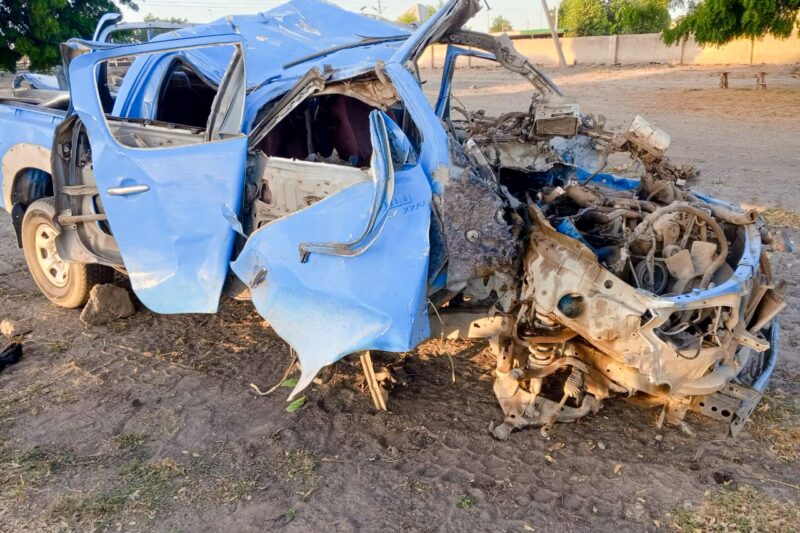Civilian joint task force members say it is the state’s responsibility to look after security operatives who have been seriously wounded in the line of duty and who can no longer fight.
Civilian joint task force (CJTF) members, who were severely wounded in counterinsurgency operations and are now no longer able to fight, are calling on the Borno State government for financial support.
They say after playing a vital role in the fight against insurgents and the restoration of peace, they have been left high and dry without enough money to provide for their families.
“Some CJTF members paid the ultimate price, dying in action in the fight against Boko Haram [the Jamā’at Ahl as-Sunnah lid-Da’way Wa’l-Jihād – JAS]. Others, like me, lost the use of our limbs and we can no longer fight,” said Bulama Modu, a former CJTF member in the Damboa Local Government Area of Borno State.
“Some of our fighters died or were seriously wounded during gunfights and in bomb or improvised explosive device [IED] blasts. We played a major role in the fight against insurgents but now that we can no longer fight, it feels as if we have been discarded by the government.”
Modu was a CJTF commander, based in Damboa town. He lost the use of his leg when he was shot while on the frontline.
“My leg was shot when Boko Haram insurgents attacked us while we are resting at our duty post. About 20 insurgents attacked us. We were outnumbered – there were only 11 of us.
“The insurgents began shooting at us and they killed some my colleagues. A few CJTF members ran for their lives.
“I was shot in the leg but, luckily, I survived the attack. I was taken to the State Specialist Hospital in Maiduguri for treatment. Doctors soon realised the extent of my wounds and I was referred to the University of Maiduguri Teaching Hospital for treatment. Unfortunately, the treatment was too expensive and I was sent home.
“I stayed at home for almost a year without doing anything. I still cannot work or farm. I am disabled.
“Even though I receive a ₦10,000 monthly government stipend, which all CJTF members get, it is not enough to provide for my family.
“I have 16 children and one wife and, in the present harsh economic climate and with everything so costly, my family and I are struggling to survive.”
Modu said he had approached government authorities and non-governmental organisations (NGOs) to try to get funds to mend his broken leg.
“It has been all in vain. No one is willing to help me.”
Lamba Bukar was a member of the CJTF in the Dikwa Local Government Area of Borno State. In 2015, at the peak of the insurgency, he lost his leg after an IED blast.
“I was in a vehicle with fellow CJTF members and soldiers. We were conducting clearance operations in the bushes. Our vehicle rode over an IED that was planted by Boko Haram. Some colleagues died in the explosion, others were severely wounded.
“I was left unconscious. My colleagues rushed me to a medical facility run by the Red Cross. When I woke up, health workers told me my leg had to be amputated. There were pieces of metal in the leg and they could not save it.
“It is nine years since I lost my leg. I’m no longer an active CJTF member. With only one leg I cannot fight side by side with other security operatives.
“I need financial support from the government because I am finding it extremely difficult to provide for my family.”
Modu Yaganam, a commander of the CJTF in Dikwa, said he had experienced three IED blasts while fighting insurgents.
“We were fighting in the bushes and forests around Dikwa. There were CJTF members, soldiers and other security operatives. We were looking for Boko Haram insurgents.
“I survived the first IED blast which happened about 10 years ago when Boko Haram insurgents captured Dikwa town. We were on a mission to retake the town when the vehicle we were in detonated an IED that had been planted by Boko Haram. Some of my colleagues were seriously wounded and two died. Luckily, I escaped without injury.
“The second IED blast occurred while we were conducting clearance operations in Dikwa. We had managed to liberate at least 150 villages and hamlets from the clutches of Boko Haram. One of the four vehicles in our convoy drove over an IED. Fortunately, we survived without any casualties and with minimal injuries.
“The third IED blast happened some years after we had successfully recaptured Dikwa town from Boko Haram. Our vehicle drove over the IED. Three of us were seriously wounded. Our legs and hands were shredded.
“We were taken to a clinic run by the Red Cross. I woke up to find my leg had been amputated. It was a shock. I will never forget it. But at least I was still alive. I was grateful for that.
“A second man also lost his leg and the third man’s arm was amputated.”
Yaganam said he had 15 children and two wives.
“I rely on the monthly stipend I get from the CJTF but it is not enough. I have approached government authorities and I even spoke to workers at a humanitarian agency. They say they would like to help but they do not have the funds.
“I am persisting with the government because I believe the state should look after those of us who were wounded in the line of duty. It’s the state’s responsibility. We helped to restore peace. Now the state must take proper care of us.”
SHETTIMA LAWAN MONGUNO









